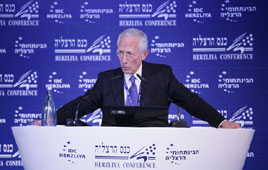 Photo courtesy IDC Herzliya Conference |
The Governor of the Bank of Israel Stanley Fischer spoke (1 February 2012) at the Herzliya Conference. The following is a summary of his remarks.
In opening, I would like to speak about the state of the global economy... Global growth is expected to be 3.3 percent, [when] a global growth rate of 3.5 percent as the boundary between recession and normal growth... European countries have realized that there is no certainty regarding expected events in the case of the departure, voluntary or forced, of a country or countries from the euro bloc, and so they have bolstered their efforts to find a solution to the eurozone problem. As a result, and as a result of efforts by the ECB and the monetary tools it is using, the probability of a crisis in the eurozone has decreased.
However, despite the uncertainty regarding how a crisis would come about, if it does come about, it is clear to us that in Israel it will be characterized by a sharp negative impact on exports. In that regard, I was pleased to hear the Director General of the Ministry of Industry, Labor and Trade, who reported progress in the signing of trade agreements with emerging markets. With that, the decline in exports can already be seen.
The Bank of Israel has begun to respond through monetary policy, and reduced the interest rate three times in recent months. We are struggling to assess what will happen in Europe, and so we cannot speak of a clear path for the interest rate. In any case, we have begun to reach decisions in the framework of the new Monetary Committee, and to date the experience has been excellent and the level of discussion has improved greatly. Professor Rafi Melnick, a member of the Monetary Committee, mentioned that financial markets are prepared to accept the fact that the deficit increased in the framework of the operation of automatic stabilizers. I agree with him, and I am sure that markets will not welcome an extraordinary increase in the deficit, such as, for example, in the framework of conducting election economics. In any case, I praise my colleagues at the Ministry of Finance on the manner in which they scrupulously maintain the fiscal framework.
There is no doubt that we must increase the capital adequacy ratio in the banking system, and we are aware of the problem that will be caused if we impose limitations on banks which will make it difficult to extend credit, and we take it into consideration.
In the housing market, we see some calm, and I was pleased to hear forecasts here of prices continuing to decline, though moderately.
Looking at short terms variables, then, we have a strong, flexible, and steadfast economy. Since I became governor of the Bank of Israel, the economy has experienced very significant stress tests, and was nearly unscathed. The economic policy framework is strong, and people in Israel have a lot of experience in dealing with tough problems, experience which helps in dealing with problems when they arise. If there will be a financial crisis in Europe, it will have a negative impact on us, but I believe that we will be able to deal with it.
From the perspective of long term variables, we are dealing with tough problems in the area of the increase in the scope of poverty. Figures show, not surprisingly, that poverty is prevalent among large families, with the probability of poverty being greater if two parents are not working, and that poverty declines with an increase in education. Figures also indicate very large - and growing - prevalence of poverty among the Arab and ultra-Orthodox populations.
Poverty among those populations is considerable because of the low rate of participation in the workforce by those populations, and I believe that that this situation is not sustainable. The situation is especially worrying when looking at demographic trends: the rate of increase of the Arab and ultra-Orthodox populations is much higher than the Jewish, non-ultra-Orthodox, population, and the share of these populations in the general population is increasing. Among Arabs, we see some decline in the rate of growth of the population, but among ultra-Orthodox it is actually the opposite.
I would like to point out that a continued increase in the share of the population which does not participate in the workforce cannot continue forever, and so will have to stop. We see positive trends - we see, for example, a change among the ultra-Orthodox, which can be seen in the fact that today there already are 6,000 ultra-Orthodox students in colleges. In the Arab sector, there is a trend of establishing independent businesses, even without government aid.
In the long term, we obviously must deal with the problem of the Israeli-Arab conflict, and the need to reach a peace agreement. In my view, the Israeli economy is a sort of miracle, and we have very talented people. If we succeed in resolving the problems of relations with our neighbors too, we will be able to achieve the growth, prosperity, and standard of living which we deserve.









